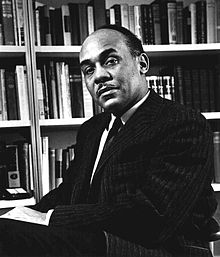 I read ‘Invisible man‘ a couple of years back and what I strictly remember about the my encounter was my serendipity to find a distinct voice contemporaneous to the two American masters: Faulkner and Fitzgerald that I found more relatable.
I read ‘Invisible man‘ a couple of years back and what I strictly remember about the my encounter was my serendipity to find a distinct voice contemporaneous to the two American masters: Faulkner and Fitzgerald that I found more relatable.
My earlier venture into the world of ‘American literature’ conferred me the role of a rather distant viewer. The kinship I felt for Whitman or later T. S. Eliot did not transpire when I endeavoured in the world of novels. It was impossible for me to place myself in the shoes of any characters of Yoknapatawpha and though I appreciated the southern Gothic voice, got mesmerized by the tremor of ‘The sound and the fury‘, felt unlayered by ‘Absalom! Absalom!‘, I never felt that I remained there, inside the story. The characters of Faulkner never became a part of me whom I may approach in a time of my personal crisis. True, the same thing cannot be said about Fitzgerald and his magnum opus. The rootless ethic bankruptcy of certain J. Gatsby or Nick Carraway moved me quite a lot, but the internalization of their tales never took place, partially because the cultural, socio-political, geographical distance between my space-time and theirs were irrevocable, partially because their novels were meant to remain of a period and never desired to be transpired as universal. And hence, whenever I embarked on a great American novel, be it by Toni Morrison or Philip Roth or Alice Walker or anyone else, I felt somewhat of a veneration that made me stand aside and watch them with the eyes of a casual onlooker rather than an involved absorbed admirer.
All that changed with ‘Invisible man’. There was an air of something else in that novel, something that I never encountered in the works of any of the American novelists. First I felt that it was the Dostoevskian tone of the novel that is ruffling me to this extent. The underlying similarity with Dostoevsky’s celebrated work ‘Notes from the underground’ was obvious. But it was not merely that, for even Fitzgerald has a certain Dostoevskian tone in his craft. What made me want to stand in the shoes of the protagonist was not his colour or his past or his rootless rambling through the dingy streets of Harlem marginalized in the vast metropolis; rather it was oozing of experience of walking the boundary of shadow and luminance and then choosing darkness over the fake light. How the protagonist remained invisible in the eyes of his beholders, how he failed to register as a person and remained but the representative of a myriad whom his beholders seen yet never seen, is a story that is universal. How many of our lives are entangled in this same drudgery of being tagged, named, identified as a representative of a creed or a race. How many of the individuals die inside these shells that society and hegemony bestows upon us in the alias of various identities that do not represent us at all. But the society is never about the identities representing the individuals, it is about the individuals representing different identities. And after almost a century of Ellison’s time, this still holds true almost universally. And hence, the novel remains more of a reflection than a remembrance of a time past.